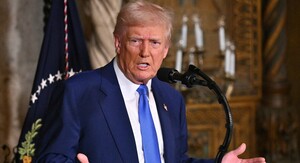The United States opposes the use of the term "aggressor" in reference to Russia in the G7 statement marking the third anniversary of the invasion of Ukraine.
This was reported by the Financial Times, citing five Western officials.
 Trump's pivot toward Putin's Russia undermines U.S. policy for generations – NYTDonald Trump’s statements about Russia are dramatically shifting American foreign policy that has been in place for decades.
Trump's pivot toward Putin's Russia undermines U.S. policy for generations – NYTDonald Trump’s statements about Russia are dramatically shifting American foreign policy that has been in place for decades.According to journalists, U.S. representatives are reluctant to use the phrase "Russian aggression" and other similar terms that G7 leaders have employed since 2022.
Meanwhile, other G7 members believe that such terminology is necessary to distinguish between Russia and Ukraine.
"The Americans are blocking this wording, but we are still working on it and hope for an agreement," an official stated.
The publication notes that Russian aggression was mentioned five times in last year's G7 leaders' statement. Furthermore, the persistence of the Trump administration in softening the language reflects a broader shift in U.S. policy, which now describes the war as the "Ukrainian conflict," two sources confirmed.
Journalists also report that Ukrainian President Volodymyr Zelensky's participation in the virtual G7 summit on Monday has yet to be confirmed. Disagreements arose after U.S. President Donald Trump referred to Zelensky as a "dictator without elections" and suggested inviting Russia back to the G7.
It is worth noting that the day before, the White House leader urged Ukrainian President Volodymyr Zelensky to hold elections as soon as possible, otherwise he would "have no country left." Several American and European politicians reacted to Trump's statements.
Previously, Zelensky commented on the U.S. president's attitude toward Russia. Among other points, he emphasized that Russians cannot be justified as they are responsible for invading Ukraine.